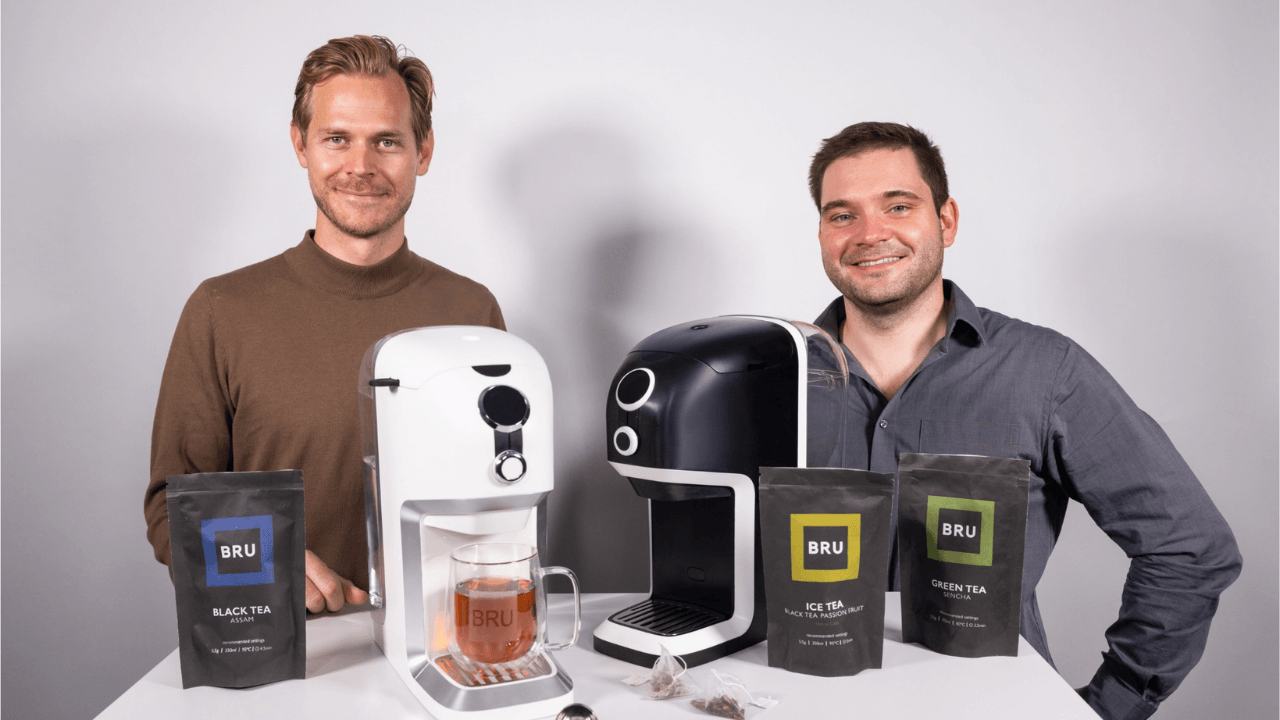If you want someone to disrupt a traditional sector, ask a startup.
Take tea. Serial entrepreneur Bogdan Krinitchko loves tea but not the process — what tea snobs call "the ritual" — of making it.
As an antipodean with UK roots, tea snobbery is in my DNA, but I feel the same. Waiting for it to brew, fiddling with a strainer, and dealing with soggy tea leaves afterwards that seem to end up everywhere are not my idea of a good time, as much as I love a cup of Earl Grey.
Swiss-based Krinitchko walked into the likes of MediaMarkt and noticed that while retailers sell over 200 different coffee machines — from filters to capsules and pots for cold brew, our overs, siphons brewing etc, for tea you only have the kettle.
Seeing a gap in the market, he came up with the idea for a machine that makes tea making as convenient as an espresso machine and joined forces with co-founder and CMO Filip Carlberg to startup BRU.

Launched in 2023, the BRU Maker One brews tea at the optimum temperature —different tea varieties that need brewing at a different temperature — and lets it brew for the desired time. Controllable at the click of a button or corresponding app, the machine is also self-cleaning, which means there's no faffing with wayward tea leaves.
And it's been a hit with consumers. Since launching, BRU has sold over 10,000 machines and reached a revenue milestone of €2 million. It's on track to more than double its revenue in 2025.
This week, the company announced that it had raised 2 million CHF (approximately €2,129 million) in new funding.
How customer feedback improved the BRU machine
However, it's not been all smooth sailing.
According to Carlberg:
"We developed the initial prototype of our tea-making machine and decided to validate the idea through a crowdfunding campaign. To our surprise, we pre-sold nearly 10,000 units—an incredible milestone.
However, the pandemic introduced significant delays, particularly with our manufacturers.
Fortunately, in hindsight, this challenge became a hidden advantage, and backers offered invaluable feedback, which helped the startup refine its design during the COVID period.”
The machine proved so popular that it ran out of stock, not an easy fix.
Further, BRU sought initial sales channels via distributors and retailers, but the process proved too slow. To adapt, the company pivoted to direct-to-consumer sales in parallel, which delivered significantly better results.
Carlberg asserts that the founder dynamic has been critical to the company's success:
"I think the dynamic between Bogdan and me is a major factor in our success. As co-founders, we complement each other really well. Bogdan is the classic engineer—methodical, systematic, and brilliant at optimising processes and automating workflows.
On the other hand, I bring a more creative and strategic approach, focusing on marketing and business growth, leveraging my previous experience."
The trials and tribulations of tea innovators
BRU is not the first to attempt a convenient coffee machine experience for tea drinks. Automatic tea-making machine Teasmade –which combines an electric kettle, an alarm clock, and a teapot was popular in the UK, particularly during the 1980s.
On the other side of the pond was US company Teforia, which developed a smart infusion device that employed a unique Selective Infusion Process (SIP) with features like micro-infusions and precise temperature control via a connected mobile app. Users could use Teforia's SIPS tea packs by tapping the pack against the RFID reader to tell the infuser how to brew the tea.
The company raised an impressive $17 million in funding; however, its $1000 price tag and poor reviews proved too much, and the company closed its doors in 2017.
Nestle's also dabbled in tea capsules with limited success.
In contrast, Carlberg asserts:
"Our willingness to continuously learn and adapt has helped us quickly overcome challenges and gain traction. That mindset has been our "secret sauce" in getting to market faster than many larger companies."
Since its launch, BRU expanded its offering to include a premium tea subscription to the machine and gained over 500 subscribers. "It will become a significant earner for us," notes Carlberg.
Besides the convenience of reaching for your phone, the app is also a valuable commodity. Carlberg shared:
"For us, the app also provides invaluable insights into customer tea-drinking habits—how often they drink, the time of day, their preferred tea varieties, and more.
This data helps us improve our offerings while remaining fully mindful of GDPR. Users will always have a clear and straightforward option to opt out of data collection."
From here, the company also has its sights set on the UK, with Carlsberg predicting: "I think we can have a lot of fun in the UK, challenging the builders' tea and the tea culture."
Lead image: Filip Carlberg and Bogdan Krinitchko, co-founders of BRU. Photo: uncredited.


